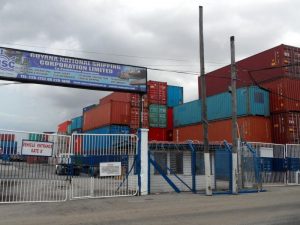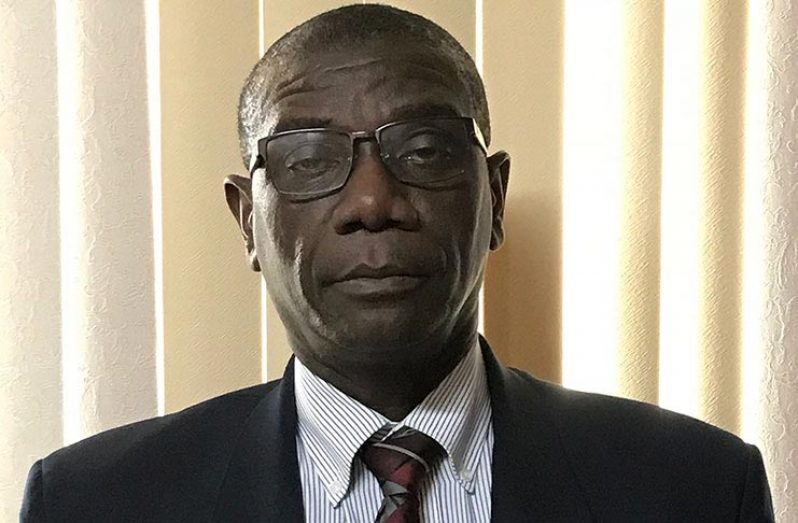By Lisa Hamilton
THE International Monetary Fund (IMF) anticipates that the COVID-19 pandemic could cause the “worst economic fallout since the Great Depression” and local Economist, Rawle Lucas, has put into perspective what such, if it becomes a reality, could mean for Guyana.

(Billion US$ and %) (WTO Secretariat)
Lucas, also a member of the Board of Directors at the Bank of Guyana (BOG), told the newspaper of the possible domino effect of a global economic crisis and gave his own advice on how Guyana could try to lessen the brunt.
To better approximate the full extent to which the pandemic can affect the global economy, one must have an idea as to how long the pandemic will last. However, Lucas said that countries around the world are still unable to accurately predict this.
Based on the predictions of international health and financial experts, the interruption in economic activity could persist. If this turns out to be true, Lucas said that it means that some form of a major recession will take place.
EFFECT ON TRADE
Apart from the health factor, he explained that COVID-19 has had a negative effect on global production, global consumption and capital accumulation, the root factors for a possible global financial crisis.
When the idea of this trickles down from the world’s leading economies —which have been hit the hardest by the virus — the Economist said that it could further affect trading for Guyana.
“What we need to recognise for Guyana is that COVID-19 has hit some major economies very hard. These are China, the UK, the US, Italy, Japan, Germany and Canada,” he said. “The US, Canada and the UK represent major trading partners for Guyana. The fourth major trading partner for us is CARICOM. So, we could see the importance that those countries have for both the import of our immediate goods and our exports.”
Collectively, Guyana’s major trading partners account for over 70 per cent of the country’s Gross Domestic Product (GDP).
On April 8, 2020, the World Trade Organisation (WTO) stated that world trade is expected to fall by between 13 per cent and 32 per cent in 2020.
“The wide range of possibilities for the predicted decline is explained by the unprecedented nature of this health crisis and the uncertainty around its precise economic impact. But WTO economists believe the decline will likely exceed the trade slump brought on by the global financial crisis of 2008?09,” the WTO stated.
With regards to imports, Luas said: “If people are not producing enough then there wouldn’t be enough for us to buy. This immediately affects Guyana’s wholesale and retail/distribution industry, construction industry and the import of vehicles to name a few”.
THE CONNECTION
The Economist explained that there is a critical connection between the negative effect on trade and production and consumption. Regarding exports, a significant drop in trade could prevent Guyana from meeting its own production needs due to limited, no access or a hike in the price of key goods needed for production.
Production in some areas is already being affected by the position of Guyana’s government — like many others — that the greater value to the country is its protection from the virus.

The government has enacted several emergency measures which give priority to essential services only. This means that every business cannot operate as normal as the only means to ‘flatten the curve’ is through strict social distancing measures.
In cases where production declines there is an effect on consumption.
Added to this, with a possible increase in the number of jobs lost as a result of a halt in production or loss of profit, the Economist said that it can have a ripple effect on how the banks deal with lending.
“You could see a liquidity crisis developing where the banks will be reluctant right now to lend money because clearly cashflow has slowed down; many people are losing wages because of job losses or reduced working hours and therefore you can’t expect the lending institutions to be too willing to lend under the conditions,” he explained.
The International Labour Organization (ILO) has already stated that COVID-19 eliminates the equivalent of 14 million jobs in Latin America and the Caribbean.
SIMILAR RESULTS, DIFFERENT CAUSE
While experts are predicting that what is to come could be worse that the 2008 Global Financial Crisis which resulted in severe economic crisis worldwide, Lucas said that the current situation would be different from the possible global economic crisis as a result of COVID-19.
The main difference, he said, is that the trigger mechanism of the 2008 crisis was of a financial nature and later affected physical production due to a lack of finances; in this instance, the pandemic inflicts a limitation on physical production from the very beginning.
As expected, the tourism and entertainment sectors would be further affected due to the ban on international travel and social distancing guidelines.
Prior to the increased cases and deaths in Guyana to the virus, President of the Tourism and Hospitality Association of Guyana (THAG), Mitra Ramkumar, had predicted that COVID-19 would most likely cripple the tourism sector in Guyana, at least for some time.
Meanwhile, Prime Minister of Antigua and Barbuda, Gaston Browne, told the IMF and World Bank earlier this month that, as a result of the drop in tourism, the Caribbean Region has been hit with an unexpected economic decline that has already stripped it of over 20 per cent of its GDP, with possibilities of prolonged deterioration

A great blow would also come to remittances as the Bank of Guyana reported in 2015 that remittances accounted for 9.3 per cent of the country’s GDP.
“A substantial portion of our remittance comes from North America and to a lesser extent from Europe and the Caribbean. If families [abroad] have to hold on now to their monies to take care of their short term and long term needs because one does not know how long this crisis will last and how deep it will go, [remittances will be affected],” Lucas said.
Fortunately, Guyana was not adversely affected by 2008 Global Financial Crisis due to the rise in demand for gold as persons turned to the mineral as a means to protect their money.
Lucas recounted that gold prices skyrocketed and the gold industry in Guyana became a significant contributor to Guyana’s economy and this enabled other industries to take off.
“Because it was not a health crisis that affected the movement of people and the consumption behaviour of people, Guyana was able to actually benefit from that without an actual crisis,” he said.
While there is much more data he could examine with more time to assess Guyana’s situation, at the time of the interview Lucas said that the advice he could give is for the country to find ways to stimulate both production and consumption.
“If people don’t have money then they can’t buy anything; if people are not buying then people will not produce because they can’t sell it. So, the way in which I would look at it from a general sense is to say that we have to find a way to put money in the hands of people. But, if important input into the production process cannot be achieved then that will not be very helpful because what we will have now is too much money chasing too few goods which could cause inflation.”



.jpg)








